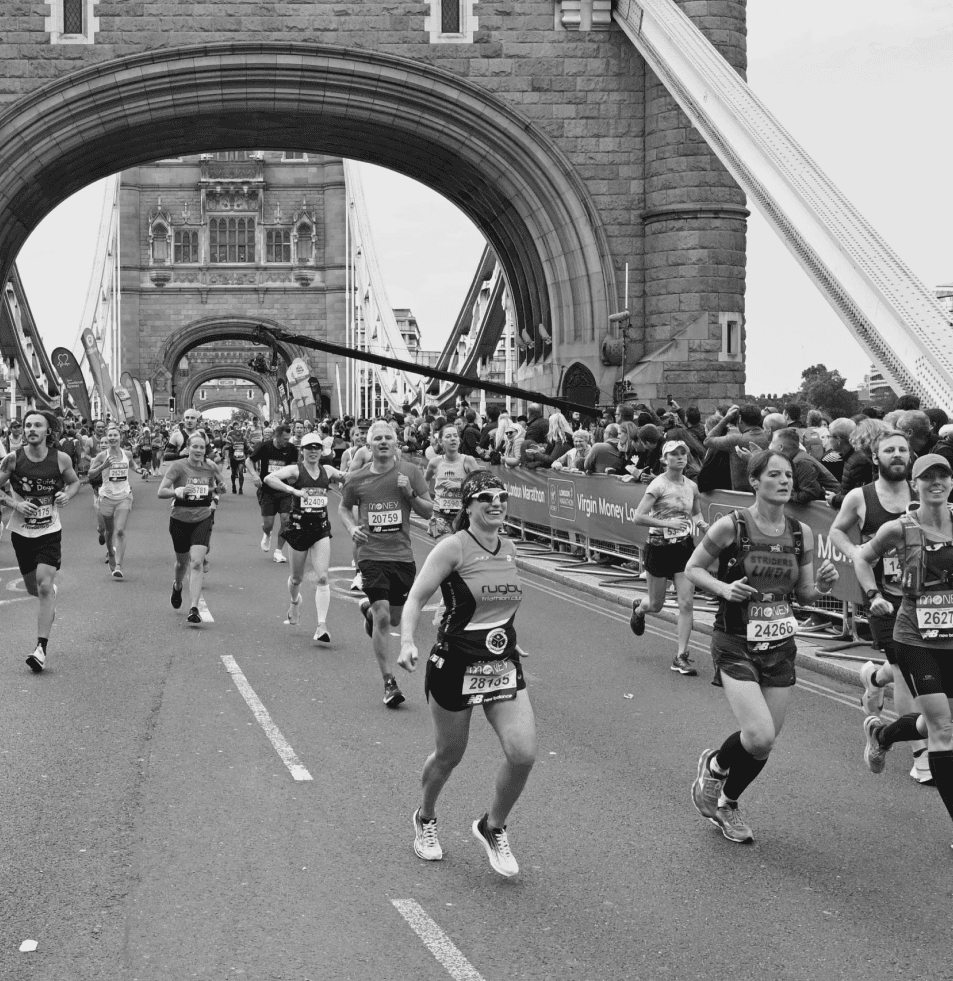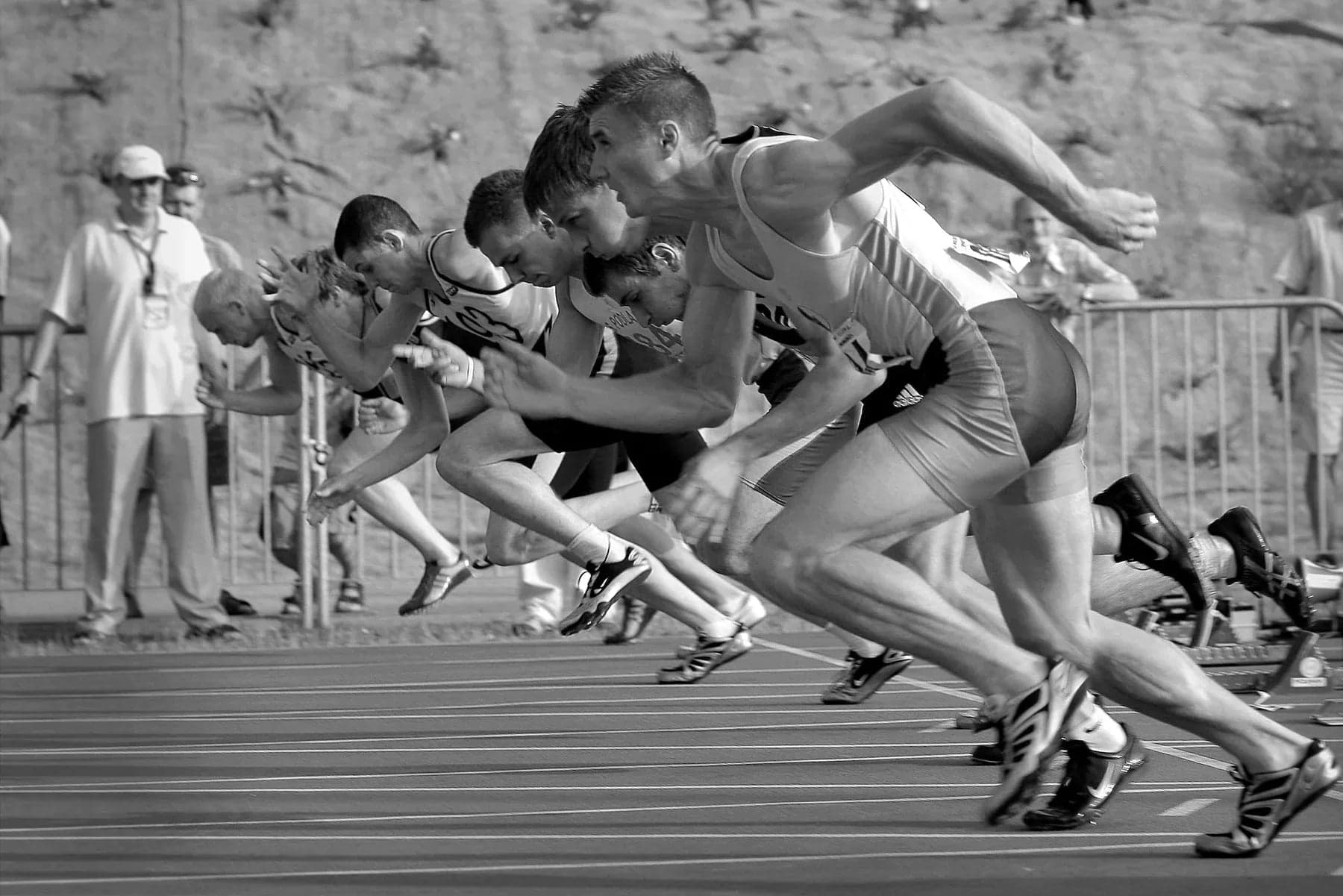Marathon Training Guide From A Running Coach & Physiotherapist

Written by: Eleanor Hoath
Written on: April 11, 2024
We chatted with James Lee when there was 6 months to go until the London Marathon. The clocks had gone back and it felt as if there was an abundance of time on our side. But now, the clocks have sprung forward, which for many means that the London Marathon is upon us. So we asked James some more questions about how you can start preparing for race day with only a few more days to go!
Q) James, what should you focus on eating before, during, and after?
The question we all wish we’d known earlier! Here you want to be focusing on CARBS (and low fibre carbohydrates especially before a race).
I advise my clients to also consider carbohydrates such as gels and drinks during the race also. Having these in your vest on race day to have as you’re running. The timing of carbohydrates is key to optimise and properly fuel performance as well as recovery. Before the race you should be using your tried and tested carbohydrate sourced meals on your training runs. During the race, your electrolyte drinks for hydration and carbohydrate sourced gels, bars or drinks to keep you going for 26 miles! When you finish your race, you’re going to want to celebrate, but making sure you refuel after with a mixed plate of all nutrients are key refuelling after a long day on the tarmac to replenish calories burnt.
Q) Should I be carb loading?
Absolutely. Carbohydrates are key to performing well for an endurance event like a marathon. It is important to practice your carb load in the lead up to the event with some of your longer runs to make sure you are well prepared for the race itself. Don't try anything new on race weekend , you don't want your gut disagreeing as you cross tower bridge! It is worth consulting with a performance nutritionist to understand what might be best for you, though it is evidenced that consuming between 10-12g of carbohydrate per kilogram of bodyweight in the days leading up to a long distance endurance event provides optimal fuel for best performance.
Q) What about alcohol? Am I allowed to drink alcohol?
Alcohol is not a performance enhancing drug. In preparation for the marathon, drinking excessive amounts of alcohol impacts sleep quality, raises your cortisol (stress hormone) and therefore is not good for recovery before running or training for endurance events. Of course this doesn't mean you should stop drinking completely if you enjoy a glass of wine or a pint with friends, though it will be of benefit to your performance and recovery, saving it for the finish line!
Q) Could I use a massage gun? What do you think of them?
Massage guns offer a 'self release' option, though is less direct and far less specific than a treatment with a healthcare professional. Massage guns change the sensation of the muscle feeling tight and those that use them do report them to be helpful in any muscular tension post exercising.
Q) How should you mentally approach race day - do you have any tips or resources?
1) Set Realistic Goals: Define your goals for the marathon, whether it's to finish within a certain time or simply to complete the race. Setting realistic and achievable goals will help you stay focused and motivated throughout your training.
2) Visualise Success: Spend time visualising yourself crossing the finish line strong and feeling proud of your accomplishment.
3) Stay Positive: Maintain a positive attitude throughout your training and on race day. Focus on your strengths and remind yourself of the hard work you've put in to prepare for the marathon.
4) Stay Flexible: Be prepared to adapt your race plan based on how you're feeling on race day. It's normal to experience highs and lows during a marathon, so stay flexible and adjust your pace or strategy as needed.
5) Focus on the Process: Instead of getting overwhelmed by the distance of the marathon, focus on the process of running one mile at a time. Break the race down into smaller, manageable chunks to make it feel more achievable.
6) Trust Your Training: Have confidence in the training you've completed leading up to the marathon. Trust that your body is prepared for the challenge and that you have the physical and mental strength to succeed.
Q) What should I make sure I have with me on race day?
Trainers + socks: Your tried and tested footwear combo! Don’t try anything new!
Running kit: This may be something that makes you stand out in the crowd so your friends can spot you, or your charity t-shirt / vest but again, make sure you have trained and completed some training before in this kit!
Any hydration and gels you are wanting to carry, this can be in your pockets or in a running hydration vest.
Your wearable tech and/or watch if recording your effort for Strava.
Q) Finally, what's your biggest tip for before, during and after the race?
Before: Formulate a plan, run it through your head regularly!
During: Nail your hydration, nutrition and pacing that you have planned for, but also make sure you really enjoy it!
After: Celebrate your achievement and enjoy your favourite meal to refuel!
Q) Are Beyond Health offering anything for marathon runners this year?
Beyond health offer the complete runners package - RunBeyond Assessment and Coaching RunBeyond is the complete runner's assessment involving Biomechanical assessment of movement, muscle strength and performance using VALD ForceFrame and ForceDecks as indicated, a video running gait analysis and advice on the sessions findings from training tweaks through to personalised training programmes all followed up with a detailed report outlining next best steps.
Beyond Health are offering Healf Readers 20% off of their RunBeyond Assessment using the quoting code HEALF20 when booking.
This article is for informational purposes only, even if and regardless of whether it features the advice of physicians and medical practitioners. This article is not, nor is it intended to be, a substitute for professional medical advice, diagnosis, or treatment and should never be relied upon for specific medical advice. The views expressed in this article are the views of the expert and do not necessarily represent the views of Healf
This article is for informational purposes only, even if and regardless of whether it features the advice of physicians and medical practitioners. This article is not, nor is it intended to be, a substitute for professional medical advice, diagnosis, or treatment and should never be relied upon for specific medical advice. The views expressed in this article are the views of the expert and do not necessarily represent the views of Healf
Eleanor Hoath is a Registered Nutritional Therapist (DipNT, mANP, mBANT) specialising in gut, skin and women’s health. She is the Editor of The Healf Source and founder of Well Nourished Nutrition Ltd.
Passionate about holistic wellbeing and balanced living, Eleanor combines evidence-based nutrition with a practical, approachable style to help people feel their best through content.
Based in London, she is dedicated to empowering individuals to nurture their health and understand the root cause of their symptoms from the inside out.




